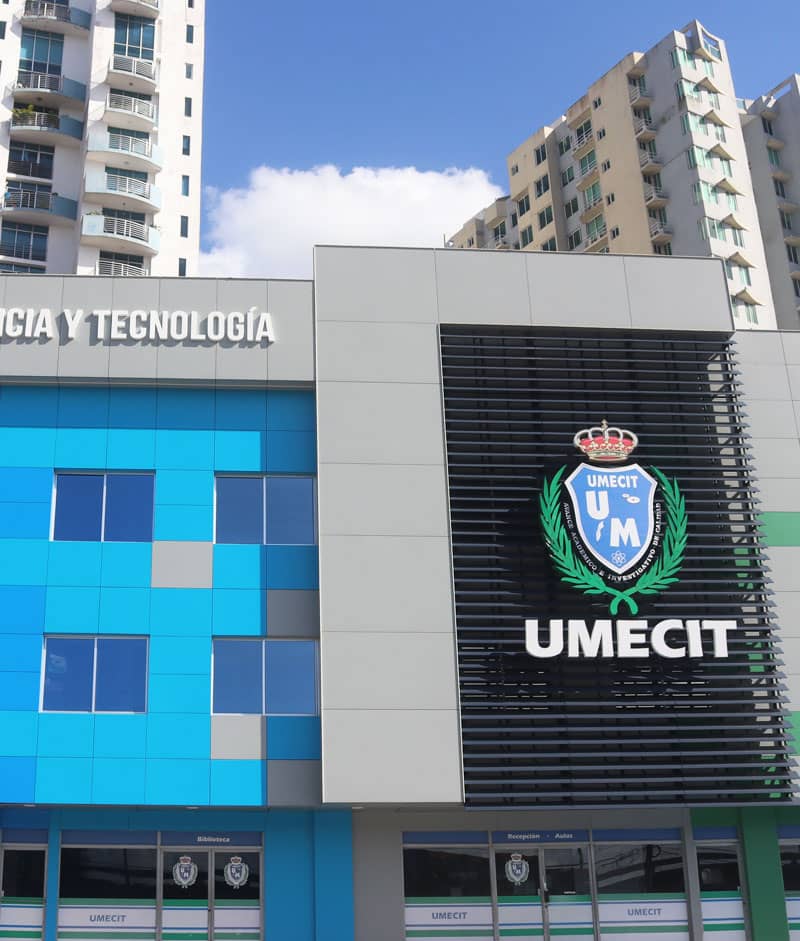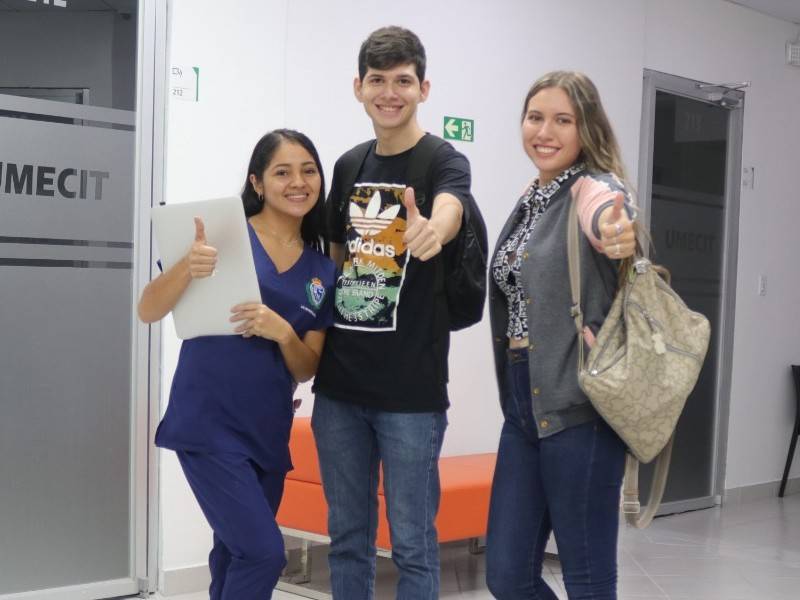UMECIT
Hotbeds of research
The United Nations Educational, Scientific and Cultural Organization (UNESCO), through the declaration of the World Conference on Higher Education (2009), states that, given the complexity of present and future global challenges, the Higher education has a responsibility to advance our understanding of multifaceted problems with social, economic, scientific and cultural dimensions, as well as our ability to deal with them. Seen in this way, the substantive functions of research, teaching and extension should promote critical thinking and active citizenship.
The World Conference on Science for the 21st Century also states: A New Commitment, when in conclusion 56 it states: "Governments of developing countries should broaden the status of scientific, technical and educational careers and make specific efforts to improve the working conditions, increase its capacity to retain scientists and promote new vocations in areas of science and technology.” (Unesco, 1999)
Universities in Panama and in Latin America in general have been taking important steps in actions aimed at generating a research culture in the academic community and the development of research skills, critical and scientific thinking, and interest in environmental problem situations. That the student is interested and worried in front of them.


UMECIT from its institutional mission, establishes the orientation towards the promotion of scientific thought and research culture in students. The UMECIT Institutional Development Plan (2023-2027) also establishes that "research is structured in the careers and academic programs offered, as a transversal axis of the curriculum" (p. 25).
The research policies specify that UMECIT will promote the creation of research seedbeds, whose primary purpose will be to develop training actions, strengthen basic research skills that allow the development of scientific competencies and actively participate in formative research activities; all of which contributes to the training of professionals with a consistent graduation profile in research.
The foregoing is formally specified in the Cyberhumanist curricular educational model by stating:
“Consequently, UMECIT is empowered by the cybernetic, humanistic and complex conception, focused on the university-student-society relationship, as axes for addressing teaching-learning situations rooted in autonomous and collaborative performance that transcends institutional limits. from technological mediation, research, entrepreneurship, innovation, and the promotion of a culture of human development leading to the visibility of ethical references that contemplate the values and good customs of our teachers and students before the generation of science and technology with social relevance, a value that is granted not only from the basic training cycle of each academic program, but also from the curricular devices corresponding to professional practices, research papers, socio-productive projects, academic field practices, among others. other forms listed as institutional policies”. (UMECIT Cyberhumanist curricular educational model, 2018)
The quality of higher education is closely associated with the practice of research. The relationship between teaching and research and training for research and the investigative mission of higher education, goes through the precision around formative research, fundamentally linked to the degree and the concretion of the mission of the university in the component of investigation.
The UMECIT Research Regulation, in its chapter VIII, article 38, states that "Research seedbeds are made up of students, mainly at the technical and undergraduate level, who, with the direction and accompaniment of a teacher, participate in research activities. training and collaborative work aimed at the development of skills and competencies in the investigative area, from inquiry and other basic processes of science such as observation, analysis, inference, construction of instruments, among others”
Formative research is considered at UMECIT as a pedagogical strategy where innovation and creativity are fostered. Its theoretical foundation is constructivism, since it assumes the active participation of the student and the teacher in the development of contextualized processes, bringing the theoretical world to daily confrontation with reality. This process is generated continuously and permanently from the classroom, consistent with the curricular design and putting the student in contact, through various training strategies, with the problems of the environment, from their professional training area.
Echeverry (2003) makes important contributions regarding the importance of formative research and its dynamization through research hotbeds, as specified below:
“…. This is why students acquire a greater professional dimension that allows them to have a vision of what research is and how it relates to their future professional activity. Investigating is a process linked to training. Undergraduate research is preparing for life, for the profession and eventually for postgraduate studies” (Echeverry, 2003).
Additionally, the author states that "formative research is conceived as research focused on practice that goes from the reflective practitioner approach of Schon (1983, 1987, 1995) and the action science methodology of Argyris, Putnam and Smith (1985). ), to the evaluation studies initiated at Harvard University (Light, Singer and Willet, 1990) and to the classroom research of Angelo and Cross (1993).»
Given the above, the research hotbeds become a space par excellence based on: "Learning to investigate, investigating", guiding the pedagogical praxis for the development of reflective and critical thinking skills, argumentation and research, through the study , documentation, reading, analysis and discussion of topics of interest to students aligned to curricular content, favoring spaces to develop skills to discover and create in students guided by teachers. They are organized by Faculty and by careers or related areas.
Research seedbeds at UMECIT
Train in research, innovation and/or technological development and entrepreneurship.
Promote the creation and activity of networks and scientific communities of students where collaborative and interdisciplinary work is evident.
Foster the critical, creative and argumentation capacity of students.
Train "seed students" in research methods and techniques, as fundamental tools for addressing problems of interest to them, associated with their area of professional training.
Promote collaborative work and foster the generation of tangible products and activities, from the dynamics of the research hotbed.

Activities and products of the Research Seedbeds
The activities that are fundamentally carried out from the research hotbeds are
the following:
to. Reading and discussion of bibliography and scientific articles
b. Participation in scientific initiation events
c. Case studies specific to your area of training
d. Basic studies supported by experimentation (data management and hypothesis testing)
and. Formulation of research projects under the accompaniment of the tutor
F. Training seminars and research training
g. Writing articles for formative or scientific research journals
h. Bibliographic search (documentation)
Yo . Collection of information in support of formal research
The products generated from the activity of the seedbeds are mainly:
to. Formulation and development of research projects
b. Publication of articles
c. Presentations at scientific events
d. Generation of prototypes or patents or technological development and its possible application
and. Others associated with the investigative work
The student who decides to belong to a research hotbed and carry out a project can learn to pose problems, formulate hypotheses, collect and synthesize information, observe, investigate, conduct interviews and surveys, consult databases and present their research products. These skills will undoubtedly help you to be a better professional and display investigative skills that are strengthened by the research itself. For his part, the teacher, through interaction, will potentiate his investigative skills and his pedagogical strategies.
(Source: Villalba Cuéllar and González Serrano, 2017)
Ethics and Responsibility
Organization and Operation of research seedbeds
Coordination of research seedbeds
Each Research Seedbed must have a designated coordinator, who will be responsible for leading and organizing the group's activities, who must be a UMECIT teacher or researcher with experience in the Seedbed's research area and has, among its main functions, promote the active participation of members, ensure compliance with the objectives and regulations, and serve as a link between the Seedbed and the academic authorities of UMECIT.
Activities of the research hotbeds:
The Research Seedbeds develop activities that contribute to strengthening the research skills of their members, such as the preparation of research projects, bibliographic review, data collection and analysis, dissemination of results, research training, among others.
For its operation and control, periodic meetings are held to discuss progress, exchange ideas, receive feedback and plan activities. In addition, they can, in coordination with the team of the Research, Innovation and Postgraduate Department, organize academic events, such as colloquia, symposiums or conferences, to disseminate the results of the research carried out.
Entry Rules to the Research Seedbed
To be admitted as an active member of a UMECIT Research Seedbed, the following requirements must be met:
a) Be an active student of UMECIT, at the Technician or undergraduate level.
b) Demonstrate interest and motivation for research in the thematic area of the Seedbed.
c) Manage the registration and registration forms of the Research Seedbed and be presented to the coordinating teacher of the Seedbed.
The registration form is done through a Google form:
The formal registration of admission to the Research Seedbed will be under the responsibility of the seedbed coordinating teacher, for review and endorsement.
The coordinating teacher will evaluate the application for admission, considering the suitability of the student in relation to the objectives and themes of the Seedbed, as well as the availability of places. Once the application has been reviewed, the coordinating teacher will issue an endorsement if the student meets the requirements and is admitted as an active member of the Research Hotbed. The student will be notified of the decision on their application for admission and will be informed about the next steps to follow to join the seedbed.

Initial bibliography:
González, Jorge Semilleros de Investigacion: a formative strategy Psychology. Advances in the Discipline, Vol. 2, no. 2, July-December, 2008, pp. 185-190 University of San Buenaventura Bogotá, Colombia
Echeverry GE (2003). The strategy of research seedbeds as a contribution to research training in university students. Brocal Magazine. Vol 3, No. 5.
January to June Envigado University Institution (IUE). (2002). Research Division Research Seedbeds. Central committee of investigations. Work document.
THE IMPORTANCE OF RESEARCH SEEDS Juan Carlos Villalba Cuéllar (Editor) Andrés González Serrano (Co-editor) EDITORIAL Prolegomena – Rights and Values 10 Bogotá, DC, Colombia – Volume XX – Number 39 – January – June 2017 – ISSN 0121-182X
SEMILLEROS FACULTY OF HEALTH SCIENCES
SEEDBEDS FOR THE DEGREE IN GENERAL PSYCHOLOGY
- SEEDBED OF RESEARCH IN EDUCATIONAL PSYCHOLOGY
“GROWING MINDS” - SEEDBED FOR RESEARCH ON FAMILY AND SOCIAL CONTEXTS “SOCIAL ROOTS”
- SEEDBED OF RESEARCH IN NEUROPSYCHOLOGY "NEUROMIND"
- SEEDBED OF RESEARCH IN LEGAL PSYCHOLOGY “KNOW-JUSTICE”
- SEEDBED OF RESEARCH IN CLINICAL PSYCHOLOGY "PSYCHOEALTH"
- SEDBED OF RESEARCH IN SPORTS PSYCHOLOGY "athletic mind"
- SEEDBED OF RESEARCH IN ORGANIZATIONAL PSYCHOLOGY "PSYCHOENTREPRENEUR"
SEMILLEROS DEGREE IN OCCUPATIONAL HEALTH AND SAFETY
SEEDS DEGREE IN PHYSIOTHERAPY
- PHYSIOTHERAPY RESEARCH SEEDGROUND "PHYSIOSALUD".
- DEx FISIOMED RESEARCH SEEDGROUND
- RESEARCH SEED IN SPORTS PHYSIOTHERAPY
- PHYSIOTHERAPY RESEARCH SEEDHEAD:
"Movement in Harmony: Exploring Biomechanics"
SEMILLEROS DEGREE IN MEDICAL RECORDS
SEMILLEROS BACHELOR'S DEGREE IN HEALTH EDUCATION

SEEDLES FACULTY OF LAW AND FORENSIC SCIENCES
SEMILLEROS DEGREE IN LAW AND POLITICAL SCIENCES
SEEDBEDS FOR THE BACHELOR'S DEGREE IN CRIMINALISTICS AND FORENSIC SCIENCES

